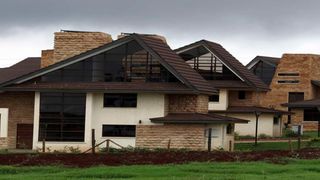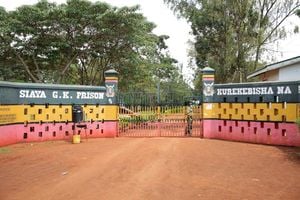
Some of the houses built by Home Afrika at Migaa, Kiambu County in 2015. Jeff Angote | Nation Media Group
| File | Nation Media GroupBusiness
Premium
Ecobank goes for Home Africa assets in Sh1bn loan row
Listed property developer Home Afrika has accused Ecobank of playing dirty in pursuit of a disputed Sh983.5 million loan, in a suit that could test the limits of Kenya’s banking laws.
Home Afrika has asked the courts to dismiss insolvency petitions filed by the lender, arguing that Ecobank’s move to auction assets used as security for the disputed loan freed guarantors from any liability.
Home Afrika stood in as a guarantor for Moru Ridge, a related company that borrowed Sh400 million from Ecobank.
Ecobank says in the insolvency petition that it is allowed to pursue loan guarantors in the event that an auction does not yield results.
The lender had last year obtained court orders, in a different case, allowing it to auction a 14-acre piece of land in Kiambu to recover the disputed loan.
Home Afrika says that despite securing court orders to auction the land that was used as security for the loan, Ecobank now wants to also use insolvency proceedings to pressure the real estate company into paying the disputed debt.
The dispute arose from a Sh400 million loan that Ecobank advanced Home Afrika, which wanted to put up 300 apartments on a 14-acre piece of land.
The suit is expected to determine whether auctions free guarantors, and could affect the implementation of Kenya’s banking laws in relation to borrowing, whichever side the High Court’s scales tip.
Insolvency
“In the circumstances, any debt owed to Ecobank on account to Moru Ridge is wholly provided for and more so, is entirely within the control and discretion of Ecobank. Ecobank has evidently resorted to these insolvency proceedings in order to arm-twist Home Afrika to enter into a compromise over a matter which has been resolved entirely at the bank’s own actions. Ecobank’s use of these insolvency proceedings are provocative and extortionate,” Home Afrika director Dan Awendo says in court papers.
Ms Edith Wanjiku, a credit risk management officer from Ecobank, argues that guarantors continue to be part of collateral even in the event that a lender opts to auction assets owned by the principal borrower.
For the Kiambu project, Home Afrika incorporated a company and named it after the project, Moru Ridge.
Moru Ridge applied for the Sh400 million loan and used the land and its developments as security, while Home Afrika and its subsidiaries – Tulip Trustee Company, Home Africa Communities Ltd and Linyanti Ltd – were listed as guarantors for the borrowing.
Ecobank sued Moru Ridge in 2018, seeking permission to auction Moru Ridge. The lender argued that Moru Ridge had failed to repay the loan. At the time, interest had pushed the loan claimed by Ecobank to Sh558 million.
In January, 2020, Justice Wilfrida Okwany allowed Ecobank to auction the property.
In spite of that, Ecobank has now opted to go after the guarantors – Home Afrika and its subsidiaries.
Moru Ridge
The lender says that the guarantors should now pay up, because the lender is unable to find buyers for Moru Ridge at the right price.
Ecobank has twice tried to auction the property. In the first auction, the highest bid was Sh300 million while the second attempt did not elicit any response from buyers.
But the developer insists that once Ecobank secured orders to auction Moru Ridge, the guarantees given by Home Afrika and its subsidiaries expired, and the lender has no authority to claim the Sh985.3 million.
Valuations done on the property indicate that Moru Ridge is 40 per cent complete, and worth Sh700 million on the market. The report indicates that the forced sale value, a lower price usually sparked by hurriedly offloading assets, is Sh525 million.
This means that the past auctions did not elicit any bids close to the forced sale value.
Home Afrika now insists that allowing Ecobank to use both the auction and shaking down guarantors would be allowing the lender to have its cake and eat it.
The developer insists that the land, without developments, is worth Sh900 million, therefore, the property’s value is more than Sh1 billion.





